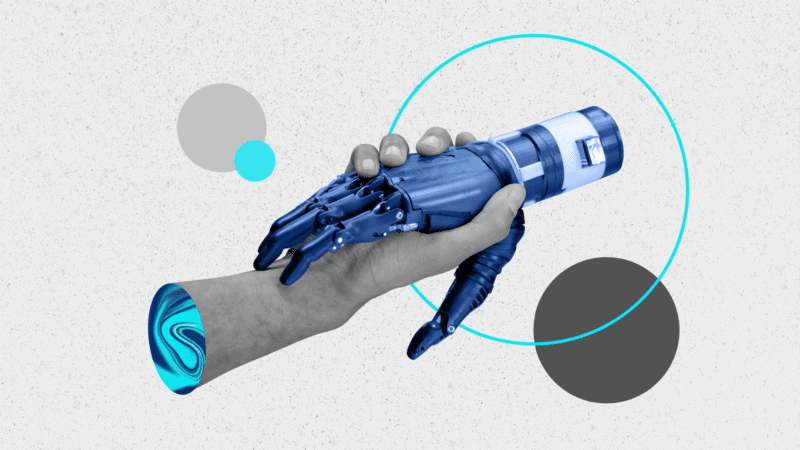
Every day, we hear how AI is reshaping marketing. Need 100 social posts tomorrow? Done. Launch a campaign before lunch? No problem. Automation is accelerating everything — but speed alone isn’t a strategy.
In 2025, 88% of digital marketers use AI in their daily workflow and the AI-in-marketing market is set to hit $27 billion this year. The broader AI industry? Projected to top $3.6 trillion by 2034. We’re not witnessing a passing trend — we’re living through a transformation.
And yet, amid the race to automate, a critical truth is emerging: the brands making the most significant impact aren’t the fastest. They’re the most intentional. When everything is automated, meaning becomes the differentiator.
Today’s buyers are more discerning. Even the slickest AI-generated content can feel impersonal. Research shows that consumers seek more authenticity, reinforcing the need for human connection and creative oversight.
The financial trajectory of AI — and why it matters
The numbers are staggering:
- AI in marketing is growing at a 25% CAGR through 2030.
- The generative AI market is forecasted to exceed $1 trillion by 2034, with other estimates at $1.3 trillion by 2032.
- Total global AI spend is projected to reach $3.68 trillion by 2034.
For marketers, these figures signal opportunity but also risk. AI promises:
- Hyper-personalization at scale.
- Real-time decision-making powered by behavioral modeling.
- Streamlined content ops that repurpose assets in seconds.
But this flood of capability also introduces complexity. Marketers must balance automation against authenticity and efficiency against empathy. Without the right strategy, even well-intentioned AI use can backfire, resulting in tone-deaf messaging, missed signals or fragmented journeys.
The challenge isn’t just technical. It’s organizational. Teams must align across marketing, sales and CX to ensure AI supports a shared vision — not just more content faster, but more connection better.
Dig deeper: Balancing the human-to-AI mix in B2B marketing
AI can accelerate, but strategy sets the direction
AI can supercharge execution. Marketing teams using it report saving 11 hours per week and increasing productivity by 44%.
But automation without alignment is just noise at scale. Nearly half of organizations cite concerns over AI inaccuracy, privacy and ethics, and 30% of marketers fear brand damage due to misinformation.
Microsoft’s CEO Satya Nadella said, “AI isn’t here to replace human intelligence but to augment it. The real magic happens when we empower people with the right AI tools.”
That’s the opportunity — and the responsibility. AI is an amplifier. It can’t replace the marketer’s job — it can only scale what we already do well. The real advantage comes when combining automation with intention, empathy and strategic clarity.
Dig deeper: How to make your content stand out in the ocean of AI slop
From tech stack to trust stack: How B2B brands are humanizing AI
The most forward-thinking B2B companies aren’t just adopting AI — they’re integrating it with purpose. They’re turning tech stacks into trust stacks by pairing automation with a buyer-first lens. Here’s how three leading brands are doing it.
Salesforce: AI as a trust multiplier
Salesforce doesn’t just ship AI features — it embeds ethics. With Einstein GPT, they brought generative AI into CRM workflows. But they also created an AI Ethics Advisory Council, added human oversight and emphasized data provenance to ensure output is reliable and auditable.
Their focus isn’t on removing humans from the loop but on letting them work with better tools. As they put it, “Move fast and earn trust.”
HubSpot: Listening before automating
HubSpot has integrated AI across the GTM experience — from email generation to sales pipeline insights. But what sets them apart is how they use AI to listen.
Their marketing, product, and CX teams use AI-powered sentiment analysis, feedback loops and behavioral testing. The goal is to optimize based on buyer intent, not assumptions.
HubSpot shows that scale doesn’t mean sacrificing connection. It can enhance it, if we listen first.
ServiceNow: From workflow automation to enterprise empathy
Once known for back-office automation, ServiceNow uses AI to deliver personalized enterprise experiences. Their Now Assist platform interprets signals across IT, HR and CX systems, surfacing contextual insights that reduce friction and improve service.
Their approach isn’t about speed for its own sake. It’s about using AI to make work more human — to free teams for strategic efforts that drive real impact.
Dig deeper: Smarter AI means bigger risks — Why guardrails matter more than ever
Strategy is the human superpower
The brands succeeding with AI are moving faster and pausing to ask, “What matters most to our buyers?” They lead with curiosity, tune into human needs and see AI as a lever to deepen creativity and connection.
Consider this:
- 83% of marketers say AI frees them to focus on strategic work.
- 81% say AI improves brand awareness and revenue — when paired with human oversight.
What winning teams do:
- Let AI handle scale, not substance.
- Use data to guide, not dictate.
- Lead with empathy and curiosity, not just efficiency.
Because buyers don’t live in dashboards, they live in moments. And it’s in those moments that brands are made or missed.
Meaning > Motion
This isn’t a moment that calls for louder marketing. It calls for deeper marketing, presence, precision and meaning. Use AI to:
- Scale what resonates.
- Eliminate what doesn’t.
- Deliver connection, not just content.
Because the future of marketing isn’t man or machine — it’s both. Working together to create momentum that matters.
Dig deeper: AI can find your ideal customers, but only humans can build real relationships
Call to action: Build with intention
Take a beat this week and ask your team:
- Where can we slow down to create something more meaningful?
- Where are we automating without awareness?
- What buyer moment could we reimagine — not for clicks, but for connection?
The real edge today isn’t speed. It’s intention. It’s marketers who know how to wield AI with heart and curiosity.
Thought leadership isn’t just about trends. It’s about impact. When prioritizing meaning over motion, we don’t just market better — we lead better.
The future belongs to marketers who blend the art of storytelling with the science of technology — who remember that while AI can drive precision, only people can build trust. As we enter this next chapter, let’s not just automate workflows. Let’s elevate them. Let’s turn every AI interaction into an opportunity to serve, surprise and strengthen relationships.
Because marketing isn’t about what’s possible. It’s about what’s meaningful.
Dig deeper: Are AI tools shaping your intentions more than you realize?
The post AI can’t create meaning — that’s still marketing’s job appeared first on MarTech.
